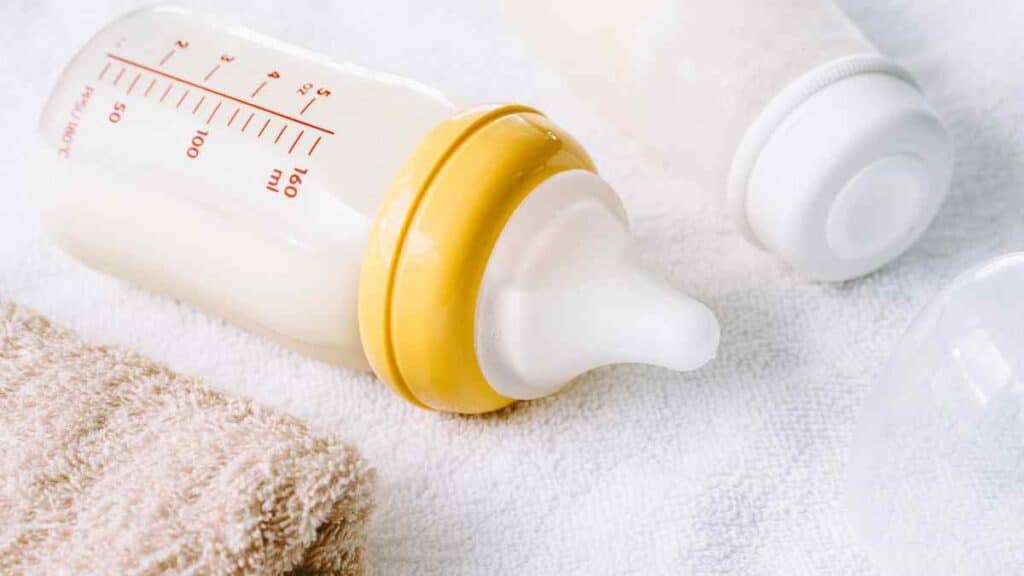As any parent knows, feeding a baby is a round-the-clock job. The current infant formula shortage adds stress and uncertainty for parents already facing challenges.
The COVID-19 pandemic has caused disruptions in global supply chains, leading to shortages of many products, including formulas. As some stores and online retailers run out of certain formula types or limit purchases. Parents wonder how to secure the needed nutrition for their baby.
This article offers tips and updates to help you navigate the formula shortage. Enabling you to feel more prepared and confident when feeding your little one.

Understanding the Current Baby Formula Shortage
The past year has been challenging for everyone, especially parents with toddlers who rely on baby formula. The cost of commonly purchased baby formula products rose by 18 percent over the past year. During this time, many families were still attempting to recover from the pandemic and economic recession.
To make things even more challenging, parents who purchased baby formula products resold their stocks only with a severe markup, causing vulnerable families to suffer even more by driving up scarcity during the baby formula shortage [1], besides the hoarding formula problems that many families face. Thus, forcing them to make unregulated homemade formula products to address the situation.
To address the supply chain issues and the infant formula product recall from Abbott Nutrition, the U.S. government and its partners have been gearing toward addressing the national shortage. For instance, the U.S. Food and Drug Administration (FDA) has released a guidance statement ensuring that infant formula manufacturers can continue their baby formula production safely and efficiently during the height of the pandemic [2].
The government continues addressing the ongoing baby formula shortage. Meanwhile, parents must find sustainable substitutes for baby formula until the issue is resolved. Let’s look closely at a few things you can do as parents to help you with the baby formula issue.

Practical Tips for Parents
Many parents facing the baby formula shortage feel overwhelmed and uncertain about how to nourish their little ones. However, there are practical steps parents can take to manage the shortage and ensure that their babies continue to thrive.
Get an Extra When Buying Formula
Parents can address the baby formula shortage by stocking up on their baby’s usual formula when available. Keep in mind that online retailers and baby formula aisles often limit how much you can buy. While waiting for normalcy, it’s practical to buy an extra can of formula whenever possible.
Check for Alternative Brands or A New Formula Type
Besides buying extra specialty formulas, consider alternative specialty formulas or switching altogether. Staying loyal to your baby’s usual formula is important. However, exploring other specialized options is practical when they are the only ones available. Speak with your child’s pediatrician for guidance on choosing a suitable regular formula for your growing toddler.
Speak with Your Baby’s Pediatrician
If you’re struggling to find formula or are worried about running out, it’s crucial to talk to your baby’s doctor. Ask them for advice on managing the shortage or finding formula through alternative channels. Your pediatrician might offer samples or temporary formula supplies to bridge the gap until you secure more.
Consider Breast Milk Banks
One option that you can consider is breast milk banks. These resources excel in assisting parents. They provide alternatives to toddler formula until their baby’s formula is back on the market. Breast milk banks are where parents can acquire donor breast milk which a human milk banking association regulates. Human milk banks offer practical nourishment for your baby. Use them until you find suitable formula products.
Stay Up to Date
Finally, staying informed about the latest updates on the formula shortage is crucial. Monitor news sources, formula manufacturers’ websites, and retailer updates for supply information. Staying informed helps you decide when and where to buy formula, reducing uncertainty and stress from the shortage.

Is Homemade Baby Formula Safe?
Because of the ongoing challenges with the availability of most cow’s milk baby formula, many families are now trying to make a homemade formula to feed their little bundle of joy. But is it safe to make your own baby formula?
Many recipes for making your own formula are circulating online, with a growing number of parents slowly considering it because of its price. However, making one at home can pose several risks to your baby’s health, especially when it comes to its growth.
Feeding babies regular cow’s milk formula or homemade formula may be the norm decades ago, but it’s no longer deemed safe or recommended by many experts. The FDA oversees the approval of formulas produced and stored. Since these types of cow’s milk formula aren’t regulated, you wouldn’t know if it has been spoiled or contaminated.
Even more, the homemade product recipes that you see online may not contain the vital nutrients found in certain specialty formulas. Also, regular dairy products such as whole cow’s milk or alternatives such as plant-based milk or goat’s milk may not contain sufficient amounts of nutrition sources crucial for your baby’s growth and can even make your baby sick.
Can You Stretch the Formula by Adding More Liquid Than What the Instructions State?
Although it may seem harmless, diluting formula doesn’t do your toddler any good. That’s because these formula products have specific liquid amounts to ensure that your baby is getting the correct amount of nutrition as printed on the packaging [3].
Adding extra water only decreases and dilutes the formula, which may stunt most babies’ growth. That’s why it’s best to consult with other health care providers to ensure that your baby is getting the right amount of nutrition that your babies need.

Alternative Options For Those Who Can’t Afford Formula
Not every family has the means to get as much formula as their baby needs. Fortunately, there are various resources available to help these families get the support that they need.
- Special Supplemental Nutrition Program for Women, Infants, and Children (WIC): Families can qualify for this program as long as their income is within the acceptable range of the program and will receive a voucher that they can use to either purchase sensitive formula or any other similar formula store brands.
- Supplemental Nutrition Assistance Program (SNAP): Qualified mothers can use their SNAP Electronic Benefits Transfer Card to purchase formula products from local food banks.
- Temporary Assistance for Needy Families: This financial assistance program provides cash assistance to qualified families to purchase enough formula to support their growing toddler.
A Year After the Formula Availability Problem
The current formula availability problem is still a huge ongoing problem for many parents who rely on infant formula to feed their babies. Despite efforts by manufacturers, retailers, and government agencies to address the shortage, many store shelves remain bare, and some parents need help to obtain the formula they need [4].
Although both private and government are now working singlehandedly to respond to the formula shortage, their solutions have been mixed. Some retailers have implemented limits on the amount of formula that can be purchased at one time. Meanwhile, others have worked to secure additional supplies of formula.
Government agencies, such as the U.S. Food and Drug Administration (FDA), have issued guidance and taken steps to help ensure that infant formula manufacturers can continue producing formula safely and efficiently during the pandemic. However, federal aid for families struggling to afford formula has dried up, leaving some families with limited options.

Conclusion
The current formula availability problem is a cause for concern for many parents who rely on infant formula to feed their babies. Despite efforts by manufacturers, retailers, and government agencies to address the shortage, many store shelves remain bare, and some parents need help to obtain the formula they need.
Private and government response to the formula shortage has been mixed. Some retailers have implemented limits on the amount of formula that can be purchased at one time, while others have worked to secure additional supplies of formula.
Government agencies, such as the U.S. Food and Drug Administration (FDA), have issued guidance and taken steps to help ensure that infant formula manufacturers can continue producing formula safely and efficiently during the pandemic. However, federal aid for families struggling to afford formula has dried up, leaving some families with limited options.
Please feel free to ask questions in the comments. I’d love to hear from you!



